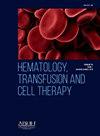Hemolytic disease of the fetus and newborn—a perspective of immunohematology
IF 1.8
Q3 HEMATOLOGY
引用次数: 0
Abstract
Background
Hemolytic disease of the fetus and newborn is a public health problem caused by maternal-fetal incompatibility; no prophylaxis is available for most alloantibodies that induce this disease. This study reviews the literature regarding which antibodies are the most common in maternal plasma and which were involved in hemolytic disease of the fetus and newborn.
Method
Seventy-five studies were included in this review using a systematic search. Two independent authors identified studies of interest from the PubMed and SciELO databases.
Main results
Forty-four case reports were identified, of which 11 babies evolved to death. From 17 prevalence studies, the alloimmunization rate was 0.17 % with 161 babies receiving intrauterine transfusions and 23 receiving transfusions after birth. From 28 studies with alloimmunized pregnant women (7616 women), 455 babies received intrauterine transfusions and 21 received transfusions after birth.
Conclusion
Rh, Kell, and MNS were the commonest blood systems involved. The geographical distribution of studies shows that as these figures vary between continents, more studies should be performed in different countries. Investing in early diagnosis is important to manage the risks and complications of hemolytic disease of the fetus and newborn.
胎儿和新生儿溶血病--免疫血液学的视角。
背景:胎儿和新生儿溶血病是由母胎不相容引起的公共卫生问题;目前还没有针对诱发这种疾病的大多数抗体的预防措施。本研究回顾了有关母体血浆中哪些抗体最常见以及哪些抗体与胎儿和新生儿溶血病有关的文献:方法:本研究通过系统性检索纳入了 75 项研究。两位独立作者从 PubMed 和 SciELO 数据库中确定了感兴趣的研究:主要结果:共发现 44 份病例报告,其中 11 名婴儿死亡。在 17 项流行病学研究中,161 名婴儿接受了宫内输血,23 名婴儿在出生后接受了输血,异体免疫率为 0.17%。在 28 项针对异体免疫孕妇(7616 名妇女)的研究中,455 名婴儿接受了宫内输血,21 名婴儿在出生后接受了输血:结论:Rh、Kell 和 MNS 是最常见的血液系统。研究的地理分布表明,由于各大洲的数据不同,因此应在不同国家开展更多研究。投资于早期诊断对于控制胎儿和新生儿溶血病的风险和并发症非常重要。
本文章由计算机程序翻译,如有差异,请以英文原文为准。
求助全文
约1分钟内获得全文
求助全文
来源期刊

Hematology, Transfusion and Cell Therapy
Multiple-
CiteScore
2.40
自引率
4.80%
发文量
1419
审稿时长
30 weeks
 求助内容:
求助内容: 应助结果提醒方式:
应助结果提醒方式:


